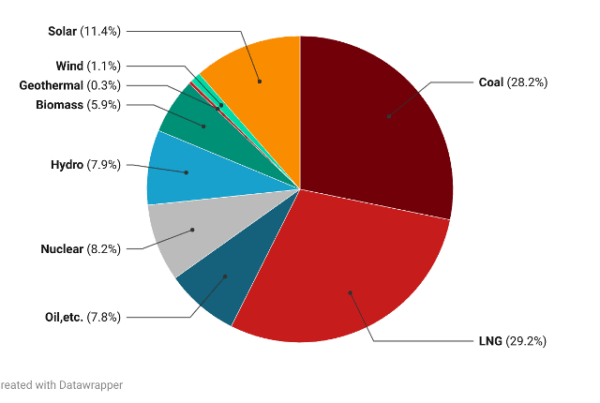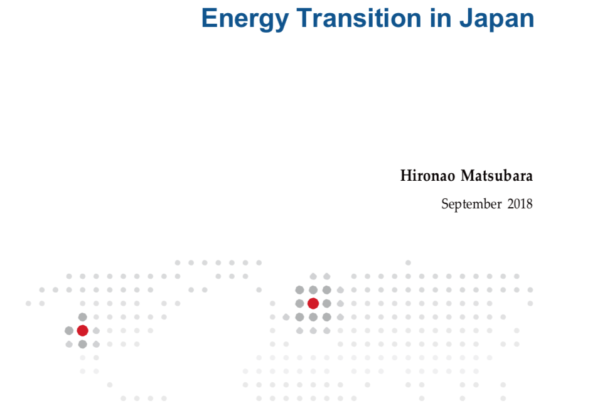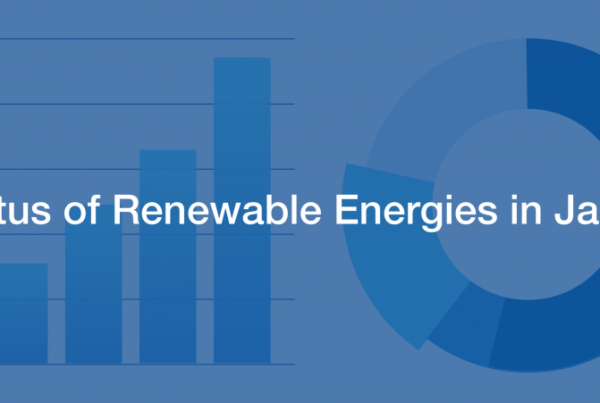At COP21 (the 21st session of the Conference of the Parties to the Framework Convention on Climate Change), to be held in Paris, France, from November 30, 2015, in order to prevent catastrophic climate change due to greenhouse gasses emitted from human economic activity, such as carbon dioxide, it is expected that there will be agreement by the countries of the world on participation in a post-Kyoto Protocol legal framework.
In order to keep the rise in the earth’s average surface temperature to less than 2ºC by the end of the 21st Century, it’s necessary to switch from a fossil fuel and nuclear power dependent energy supply structure and, at the same time, there must be a fundamental reform from a large energy consumption society to a low energy society. The IPCC’s (Intergovernmental Panel on Climate Change) Fifth Assessment Report[1], the first in seven years, states that there is a clear scientific basis showing that humans are starting to be affected by climate change and that anthropogenic greenhouse gasses such as CO2 are the cause and that there is a need to take appropriate measures for the vulnerable areas starting to be affected.
ISEP announces the following statements for COP21.
1. Make renewable energy the mainstream of energy
It goes without saying that a fundamental change to the energy supply system is necessary in order to reduce the amount of climate-change-inducing greenhouse gasses that are emitted. Of course, the center of measures against climate change are increased energy efficiency and conservation of energy but, it is also necessary to make renewable energy the main source of energy.
Renewable energy, which has solar energy, wind, hydro, geothermal and biomass as its origins, can be used equitably around the world, it is a democratic energy in which anyone can participate, it contributes to the energy independence and economic independence of regions and countries, its adoption is actually growing rapidly, it is a clean resource that can be used forever and, since it is the only energy which can be used sustainably, it should be the main source of energy.
2. Don’t rely on CCS and nuclear power which have poor prospects of being realized
In some counties, nuclear power is thought of as one of the ways of countering climate change but the March 11th Fukushima Daiichi Nuclear Power Plant accident made it clear that this has great risk (terrible accidents, nuclear waste, nuclear proliferation, etc.). Also, the realization of Carbon Collection and Storage (CCS) is still a huge technical difficulty and, with the liberalization of energy it’s even necessary to reduce the number of coal-fired power plants being considered in Japan and other countries, building new ones would clearly hurt the realization of climate change policies. With the risk of investment and the non-democratic character of these energy sources they are, in fact, not proceeding and are not energy types that should be pursued.
3. Aim for 100% renewable energy in a bottom-up approach led by regions and with citizen participation
Each country and region should aim for 100% renewable energy as a long-term measure against climate change. With regards to renewable energy, which is the only sustainable source of energy, we, at the Institute for Sustainable Energy Policies (ISEP), support projects in various regions aiming for 100% and are a founding partner of Global 100% RE[2] and are participating in various activities.
A bottom-up approach, with citizen participation and region leadership, is particularly important. At the Prefecture level, Fukushima and Nagano Prefectures are already aiming for 100% renewable energy and the Community Power project, which is a project where regions around the country take the initiative on renewable energy, is expanding[3].
4. Agreement on ambitious targets for climate change countermeasures
IPCC’s Fifth Assessment Report clearly shows a feeling of crisis regarding the threat of climate change and clearly shows that it is an urgent issue for all the countries of the world. First, the Japanese government and the regional municipalities must clearly indicate a path to realize the long-term goal of 80% reductions of greenhouse gasses by 2050, which was decided on by the Cabinet, and raise the insufficient emissions target of 26.0% (by fiscal 2030, compared to 2013) indicated in the INDC of July, 2015 to a fair and ambitious target (at least 40%, compared to 1990) to attain the less than 2ºC which has been agreed to by the governments of the various countries[4].
On top of that, a concrete roadmap of global warming countermeasures must be made clear and the nation and regional municipalities must re-consider the fundamentals of energy policies in general. Based on that, we strongly call for the governments of each country to draw up high reduction targets and for all stakeholders to participate and undertake concrete measures against global warming.
Reference
[1] IPCC Fifth Assessment Report, http://www.env.go.jp/earth/ipcc/5th/[2] Global 100% RE, http://www.go100re.net/
[3] International Community Power Conference 2014 in Fukushima https://www.isep.or.jp/en/cp2014/
[4] CAN-Japan “Climate Action Network Japan” http://www.can-japan.org/en/1821





